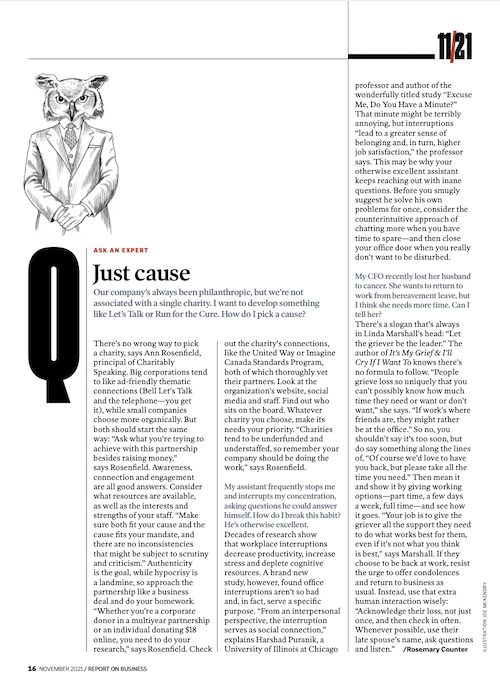Just cause
Report on Business: Ask an Expert
Our company’s always been philanthropic, but we’re not associated with a single charity. I want to develop something like Let’s Talk or Run for the Cure. How do I pick a cause?
There’s no wrong way to pick a charity, says Ann Rosenfield, principal of Charitably Speaking. Big corporations tend to like ad-friendly thematic connections (Bell Let’s Talk and the telephone—you get it), while small companies choose more organically. But both should start the same way: “Ask what you’re trying to achieve with this partnership besides raising money,” says Rosenfield. Awareness, connection and engagement are all good answers. Consider what resources are available, as well as the interests and strengths of your staff. “Make sure both fit your cause and the cause fits your mandate, and there are no inconsistencies that might be subject to scrutiny and criticism.” Authenticity is the goal, while hypocrisy is a landmine, so approach the partnership like a business deal and do your homework. “Whether you’re a corporate donor in a multiyear partnership or an individual donating $18 online, you need to do your research,” says Rosenfield. Check out the charity’s connections, like the United Way or Imagine Canada Standards Program, both of which thoroughly vet their partners. Look at the organization’s website, social media and staff. Find out who sits on the board. Whatever charity you choose, make its needs your priority. “Charities tend to be underfunded and understaffed, so remember your company should be doing the work,” says Rosenfield.
My assistant frequently stops me and interrupts my concentration, asking questions he could answer himself. How do I break this habit? He’s otherwise excellent.
Decades of research show that workplace interruptions decrease productivity, increase stress and deplete cognitive resources. A brand new study, however, found office interruptions aren’t so bad and, in fact, serve a specific purpose. “From an interpersonal perspective, the interruption serves as social connection,” explains Harshad Puranik, a University of Illinois at Chicago professor and author of the wonderfully titled study “Excuse Me, Do You Have a Minute?” That minute might be terribly annoying, but interruptions “lead to a greater sense of belonging and, in turn, higher job satisfaction,” the professor says. This may be why your otherwise excellent assistant keeps reaching out with inane questions. Before you smugly suggest he solve his own problems for once, consider the counterintuitive approach of chatting more when you have time to spare—and then close your office door when you really don’t want to be disturbed.
My CFO recently lost her husband to cancer. She wants to return to work from bereavement leave, but I think she needs more time. Can I tell her?
There’s a slogan that’s always in Linda Marshall’s head: “Let the griever be the leader.” The author of It’s My Grief & I’ll Cry If I Want To knows there’s no formula to follow. “People grieve loss so uniquely that you can’t possibly know how much time they need or want or don’t want,” she says. “If work’s where friends are, they might rather be at the office.” So no, you shouldn’t say it’s too soon, but do say something along the lines of, “Of course we’d love to have you back, but please take all the time you need.” Then mean it and show it by giving working options—part time, a few days a week, full time—and see how it goes. “Your job is to give the griever all the support they need to do what works best for them, even if it’s not what you think is best,” says Marshall. If they choose to be back at work, resist the urge to offer condolences and return to business as usual. Instead, use that extra human interaction wisely: “Acknowledge their loss, not just once, and then check in often. Whenever possible, use their late spouse’s name, ask questions and listen.”
